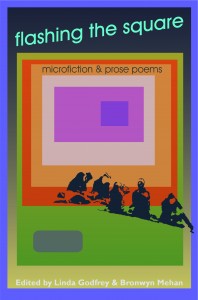 MARK SMITH won the 2013 joanne burns Award with his microfiction, ‘10.42 from Sydenham’ and this year his piece, ‘The Meteorologist’s Daughter’ was runner up. We caught up with him recently to ask him about his microfiction and what inspires him to write.
MARK SMITH won the 2013 joanne burns Award with his microfiction, ‘10.42 from Sydenham’ and this year his piece, ‘The Meteorologist’s Daughter’ was runner up. We caught up with him recently to ask him about his microfiction and what inspires him to write.
1. What inspired you to write the prose poem/microfiction which is published in Flashing the Square?
I’ve always been interested in magical realism and I think microfiction lends itself to it very well. I started with the title The Meteorologist’s Daughter and allowed my imagination to run. I conjured up a girl born with the imprint of a weather chart on her skin and wondered what she would do when she realized the chart had begun to move – reflecting her moods and influencing her life’s direction.
2. Tell us about your process. (Do you start sparse and widen out, or do you write down every possible association and cut back? Do you research the subject matter you are writing about? Is it pure intuition?) Take us through an example if you want.
This story started as a longer piece – about 600 words – and was then pared back. It is such a challenge to actually tell a story in 200 words, rather than just present a collection of images. I had to find the essence of the story, as it originally had three main threads to it. I realized the essence lay in the responsibility the girl felt for the effects adverse weather was having on the people around her. She was able to protect them by looking at her body and passing on the information she gleaned from the movement of the chart.
3. What advice do you have for other writers? (About the first or last line? About how to choose the title? Do you follow any rules?)
I think more than any other form, microfiction relies on the absolute conciseness of every word – not just the first and last lines – though these of course are very important. There cannot be a word out of place. And every sentence needs to work almost on its own. You still need to achieve what you might otherwise take two or three thousand word to develop – character, plot and narrative arc. And the last sentence needs to hit the reader between the eyes!
4. Who or what inspires your writing?
Reading inspires me to write – new writing or going back to books I have loved reading. Other than that, time on my own is important – I’m a coastal person so a day on a remote beach or a long surf with friends are always conducive to writing. And days alone down in a little cottage on the east coast of Tassie, sitting in the silence and looking back up at the mountains or out along the white sand beaches.
5. Tell us what you do if you haven’t written anything in a while and you want to get started writing again? Could you share your favourite writing exercise with our readers?
The best tactic for me is to clear my diary, do some yoga to set myself up for the day, turn the phone off, disconnect the modem and have the promise of a reward at the end of each two hour stint – a home brewed coffee or a walk along the beach. I set myself a word total for each session and write until I get there. And before I finish for the day I make up dot points about what I will write the next day. Disciplined huh?! Not really! I need to do this because I’m not disciplined enough.
